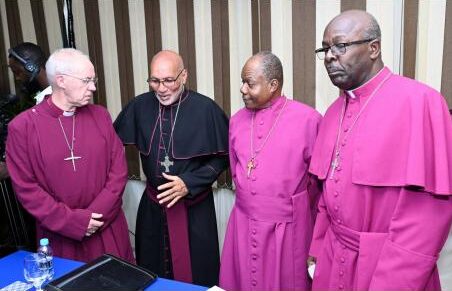Descendants of enslaved Africans should manage £100 million fund, says Archbishop of Canterbury
The following article is republished from The Gleaner and was written on July 20, 2024 by Kimone Francis.

England’s most senior cleric has declared that the £100 million fund, established to address the past wrongs of the Church and its role in slavery, must be managed by the descendants of victims.
Justin Welby, the Archbishop of Canterbury in the Church of England who noted that reparation is not necessarily an act of compensation, said the impact of the fund will be guided closely by an oversight committee that advises the Church.
That committee consists of representatives primarily from the Caribbean and West Africa.
“The nature of slavery was terrible; genocidal crime committed against people, things done to them. So the use of these monies must be done with people and under the advice and not with simply folks from far away doing what they’ve decided to do,” Welby, a member of the House of Lords in the British Parliament known for his public stance on controversial issues related to justice, said.
He was speaking at a press conference to mark the celebration of the 200th anniversary of the Diocese of Jamaica and the Cayman Islands at Church House in St Andrew.
Welby commissioned a forensic audit of the Church of England finances to determine how the Church might have bene`fitted from involvement in the Transatlantic slave trade.
The audit resulted, not only in acknowledgement of the Church’s involvement in what has been described as a crime against humanity, but also in the first substantial expression from any European beneficiary of enslaved labour to make available the £100 million.
Process of healing
The money is to facilitate a process of healing, restoration and reconciliation in relation to descendants of enslaved ancestors.
“It will be aimed at creating possibilities for people through investment, particularly I suspect in areas like education which we also hope will produce also income for the fund so the fund becomes self-sustained,” said Welby.
Meanwhile, he believes that the local church has done enough to serve Jamaica.
“We do what God gives us the resources to do and the rest is up to God. The more resources God gives us the more we give,” said Welby.
“It will be aimed at creating possibilities for people through investment, particularly I suspect in areas like education which we also hope will produce also income for the fund so the fund becomes self-sustained,” said Welby.
Meanwhile, he believes that the local church has done enough to serve Jamaica.
“We do what God gives us the resources to do and the rest is up to God. The more resources God gives us the more we give,” said Welby.
The local church is one of the oldest overseas dioceses within the Anglican Communion.
Welby said that has been the attitude of the Anglican Church in the country.
“They do everything they can but their resources have limits. But yes, I have a great deal of confidence they [are]. The way the Anglican community works, it’s an independent church, autonomous with brotherly relations with other Anglican churches and it’s one of those in which I have learnt a lot,” he said, adding, “We can all do better. We can always hope to be better.”
